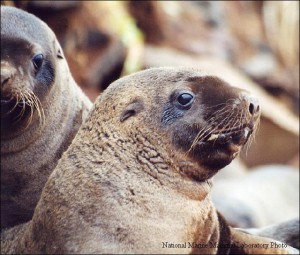After a research review, the National Marine Fisheries Service is prepared to loosen controversial limits on fishing in the western Aleutian Islands.
NMFS closed fishing grounds three years ago to protect an endangered population of Steller sea lions. That triggered several rounds of litigation and a new evaluation of the science behind fishing bans.
Brandee Gerke is a NMFS resource management specialist. She helped the agency write its new biological opinion on whether increased fishing would harm sea lions.
 “We don’t have any direct scientific evidence that fisheries are causing nutritional stress in Steller sea lions,” Gerke says.
“We don’t have any direct scientific evidence that fisheries are causing nutritional stress in Steller sea lions,” Gerke says.
That has cleared NMFS to open more fishing grounds in the western Aleutians, according to a plan that was approved by the North Pacific Fishery Management Council.
Gerke says that biologists still have lingering concerns about how to harvest fish safely in critical habitat areas without disturbing Steller sea lions.
“NMFS is still recommending that the fishery be dispersed over a greater amount of time,” Gerke says. “So not going in and catching fish in a very concentrated fashion.”
Those recommendations will be included in a proposed rule from NMFS. They’ll take public comments on the regulations. But if they’re finalized, fishermen will have access to previously forbidden stocks of Atka mackerel, Pacific cod and pollock as early as next year.
Michael LeVine says that’s pretty sudden. LeVine is a lawyer for Oceana — an environmental group that’s been fighting for years to uphold fishing bans in the western Aleutians.
“The controversy is about whether removing 60% of the fish that used to be there is contributing to the continuing decline of the species and its overall failure to recover,” LeVine says. “Historically, the agency has said that is has. This new analysis, we think, reflects a step back from that very well scientifically-justified position.”
LeVine wouldn’t comment on whether Oceana might sue to keep fishing grounds closed.
At least one group applauded the decision to loosen restrictions. The Aleut Corporation holds a small amount of pollock quota in the western Aleutian Islands. It’s supposed to bring business to Adak, but the share is an area that was closed — until now.
In a statement, the Aleut Corporation said it’s grateful for any new fishing opportunities that will come as a result of the federal study — for Adak, and for other communities throughout the Aleutian Chain.




